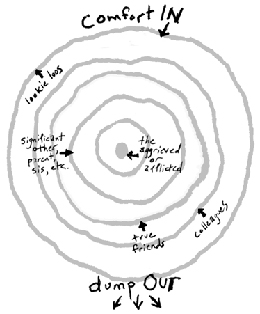 Iran’s Attack on Israel
Iran’s Attack on Israel


6 min read
How to best interact with someone going through a crisis.
Over the last few years, a few YouTube videos were made mocking the sometimes stupid and foolish things that people say when visiting the sick or comforting the mourner. Things like, "I know someone who had the same sickness as you. They suffered terribly and died after a short time. I hope that doesn't happen to you." Or, "sorry for the loss of your child; at least you have other healthy children that you should be grateful for." I know of one woman who shared with her family and friends a list she had compiled of the top ten moronic things people said to her when she was sitting shiva.
 Clearly, the people who uttered those imprudent and thoughtless expressions meant no harm and indeed would be horrified to learn that they had compounded pain rather than relieved it. Rather than stemming from malice, I suspect that these comments are the result of an earnest desire to be comforting and yet feeling at a loss for the right thing to say.
Clearly, the people who uttered those imprudent and thoughtless expressions meant no harm and indeed would be horrified to learn that they had compounded pain rather than relieved it. Rather than stemming from malice, I suspect that these comments are the result of an earnest desire to be comforting and yet feeling at a loss for the right thing to say.
Susan Silk, a clinical psychologist, recently wrote an op-ed for the LA Times in which she shared her fantastic "Ring Theory" for helping people in crisis:
Draw a circle. This is the center ring. In it, put the name of the person at the center of the current trauma. Now draw a larger circle around the first one. In that ring put the name of the person next closest to the trauma. Repeat the process as many times as you need to. In each larger ring put the next closest people. Parents and children before more distant relatives. Intimate friends in smaller rings, less intimate friends in larger ones. When you are done you have a Kvetching Order. One of [my] patients found it useful to tape it to her refrigerator.
Here are the rules. The person in the center ring can say anything she wants to anyone, anywhere. She can kvetch and complain and whine and moan and curse the heavens and say, "Life is unfair" and "Why me?" That's the one payoff for being in the center ring.
Everyone else can say those things too, but only to people in larger rings. When you are talking to a person in a ring smaller than yours, someone closer to the center of the crisis, the goal is to help. Listening is often more helpful than talking. But if you're going to open your mouth, ask yourself if what you are about to say is likely to provide comfort and support. If it isn't, don't say it. Don't, for example, give advice. People who are suffering from trauma don't need advice. They need comfort and support. So say, "I'm sorry" or "This must really be hard for you" or "Can I bring you a pot roast?" Don't say, "You should hear what happened to me" or "Here's what I would do if I were you." And don't say, "This is really bringing me down."
If you want to scream or cry or complain, if you want to tell someone how shocked you are or how icky you feel, or whine about how it reminds you of all the terrible things that have happened to you lately, that's fine. It's a perfectly normal response. Just do it to someone in a bigger ring.
Comfort IN, dump OUT.
The Ring Theory is a brilliant prescription for how best to interact with someone going through a crisis. It captures something we intuitively know yet too often fail to practice. In fact, it probably should be posted on hospital room doors and entrances to shiva homes.
However, for all of its brilliance, the Ring Theory takes something for granted that, unfortunately, is not a given at all. The theory provides guidance for those choosing to engage. But ask anyone who has gone through a crisis and he will tell you, the majority of people in his life didn't comfort or dump, neither in nor out. They simply disappeared.
Yes, at the moment of crisis, family, friends and community often rise to the occasion. True, funerals and shivas are often well-attended, hospital rooms and ICU's get lots of visitors, and parties to divorce get invitations the first few weeks following the separation. But what happens when the acute crises passes? How present are we in the lives of those we claim to care deeply about when the urgency subsides and the catastrophe dissipates?
As time goes on, without consciously intending to, many take an "out of sight, out of mind" approach, leaving the afflicted person feeling forgotten, neglected, insignificant and alone. What the "Ring Theory" doesn't account for is that doing nothing and staying silent towards someone struggling with illness, loss, divorce or unemployment can be more painful than saying or doing the wrong thing. An insensitive comment is hurtful, but at least it communicates an attempt to connect and comfort. Silence and neglect, however, leave a person feeling invisible, that she doesn't matter, and that friends think that her problems are contagious and transmittable.
Sometimes our silent presence is the greatest comfort of all.
Nobody suffered more than Job. The response of his friends is very instructive and in fact is codified in Jewish law. The book of Job describes that as he suffered profoundly, his friends silently comforted him. Isn't that an oxymoron? If they remained silent, where was the comfort? The answer is simple: their mere presence communicated much more at a louder decibel level than anything they could have possibly said. In fact, Job’s suffering was so inexplicable and incomprehensible that there was nothing meaningful to offer at all. Had they opened their mouths, they likely would have provided great material for a YouTube video.
It is for this reason that Jewish law requires us to remain silent until the mourner speaks first. Moreover, even once we speak, the Rambam cautions us not to be talkative or loquacious lest we say the wrong thing or set the wrong tone with our words.
Sadly, there are many in our community suffering from illness, loss and other sources of pain. Simply put -- they rely on us, their friends and community to care enough to enter the Ring. Perhaps we will be towards the center of the circle, or maybe we will be in one of the outside concentric rings. But the worst thing we could do is to disappear from the picture all together.
Reach out, visit, send a text, spontaneously drop off flowers or a Challah, invite for a meal, or just let them know that you pray for them, think about them, and empathize with them. Find the important balance between showing up and providing them necessary space.
Let's do all we can to make sure that these videos have no sequel because we have learned how to comfort IN, dump OUT and that sometimes our silent presence is the greatest comfort of all.
